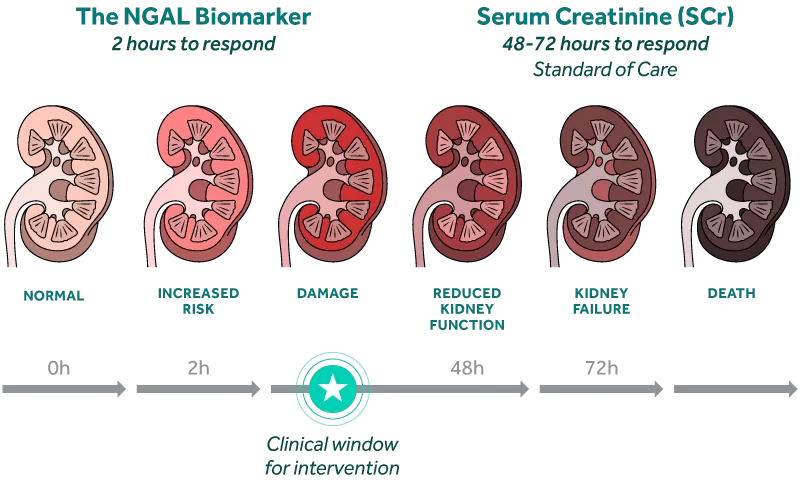Identify AKI When It Matters Most
The NGAL Test allows you to know earlier so you can confidently manage your patients better.
Make Every Hour Count
By integrating damage biomarkers into clinical assessment, clinicians can discriminate AKI etiology and assess severity earlieri allowing for earlier initiation of therapies to improve patient outcomes.ii


Identify AKI Days Earlier
The NGAL Test* quantifies levels of neutrophil gelatinase-associated lipocalin (NGAL) in human urine, EDTA and heparin plasma. NGAL measurements are useful in the diagnosis of acute kidney injury which may lead to renal failure. Confidently take action to manage fluid levels, avoid nephrotoxic agents, and potentially prevent permanent kidney damage.iii
*CE-Marked in the EU; registered in Canada, Israel, Korea, and other countries.
Get Started Today
From initial exploratory meetings and clinical education to economic justification and lab validation, the BioPorto team has experience onboarding this important test.
With SCr, AKI Diagnosis Can Take Days
Identifying Acute Kidney Injury (AKI) early is difficult because the current standard of care relies on changes in serum creatinine and urine output, physiologic endpoints that are delayed, non-specific, and impacted by extrarenal factors such as nutrition status and muscle mass.iii

“I have changed my management decisions on rounds and definitely changed the way I approached different patients based on NGAL results.”
– PCICU Intensivist
About the Assay
A particle-enhanced turbidimetric immunoassay for the in vitro quantitative determination of neutrophil gelatinase-associated lipocalin (NGAL). Runs on standard automated clinical chemistry analyzers.
SAMPLE TYPE
Urine or plasma
ASSAY RUN TIME
~ Approximately 10 minutes; varies by analyzer
RESULT AVAILABILITY
Similar to a comprehensive metabolic panel; varies according to your laboratory’s collection and processing schedule
What is the NGAL test?
The NGAL Test is a particle-enhanced turbidimetric immunoassay for the quantitative determination of neutrophil gelatinase-associated lipocalin (NGAL) in human urine, EDTA plasma and heparin plasma on automated clinical chemistry analyzers. NGAL measurements are useful in the diagnosis of acute kidney injury (AKI) which may lead to acute renal failure.
Does the NGAL test diagnose Acute Kidney Injury? (AKI)
The NGAL Test is a marker of kidney tubular damage, which could lead to acute kidney injury depending on duration and severity. In 2020, the Acute Disease Quality Initiative (ADQI) workgroup recommended integrating damage and functional biomarkers “to improve the diagnostic accuracy of AKI, to recognize the different pathophysiological processes, to discriminate AKI etiology, and to assess AKI severity.”ii
Is the NGAL test FDA cleared?
No. The NGAL Test is CE-marked in the European Union and is registered in other countries including Canada, Korea, and Israel. ProNephro AKI™ (NGAL) is FDA-cleared for use in the United States.
What is needed to run the NGAL test?
To run The NGAL Test in your laboratory, there are three BioPorto products required:
- The NGAL Test Reagent Kit, containing: o Reaction Buffer (35 mL, ready-to-use buffer solution containing murine protein and preservative) o Immunoparticle Suspension (7 mL, ready-to-use suspension of polystyrene microparticles coated with mouse monoclonal antibodies to NGAL)
- The NGAL Test Control Kit: Low Control, 3 x 1 mL; and High Control, 3 x 1 mL, ready-to-use
- The NGAL Test Calibrator Kit: 5 vials of 1 mL: 50, 150, 600, 1500, 3000 ng/mL, ready-to-use
Can the NGAL test be used with both plasma and urine?
Yes. The NGAL Test works with human urine, heparin plasma and EDTA plasma.
When should I run the NGAL test?
A clinician should order an NGAL test when they suspect AKI in high-risk patients (those who are critically ill, have had cardiac or other major surgery, and patients with sepsis, respiratory compromise, cirrhosis, etc.). In conjunction with other laboratory results and clinical assessment, an NGAL result can help clinicians identify AKI earlier allowing for earlier and more appropriate interventions that may improve patient outcomes.
How long does it take to get a result?
It takes approximately 10 minutes for the assay to run on standard automated clinical chemistry analyzers. Result turn-around time to the clinician is similar to a comprehensive metabolic panel, depending on institutional processes and procedures.
What actions do I take based on the NGAL result?
Clinicians who suspect AKI in their patients should follow the 2012 KDIGO AKI care bundlei , which includes optimizing hemodynamics and fluid status, preventing nephrotoxic insults, and avoiding hyperglycemia. Please contact us at [email protected] if you'd like to connect with a peer to learn how they are using NGAL in their patients and clinical settings.
The NGAL Test™ is a particle-enhanced turbidimetric immunoassay for the quantitative determination of neutrophil gelatinase-associated lipocalin (NGAL) in human urine, EDTA plasma and heparin plasma on automated clinical chemistry analyzers. NGAL measurements are useful in the diagnosis of acute kidney injury (AKI) which may lead to acute renal failure.
* The NGAL Test is CE-Marked for in vitro diagnostic use in the European Union; registered in Canada, Korea, Israel, and several other countries.
iOstermann M, Zarbock A, Goldstein S, et al. Recommendations on Acute Kidney Injury Biomarkers From the Acute Disease Quality Initiative Consensus Conference: A Consensus Statement JAMA Netw Open. 2020;3(10):e2019209.
iiDevarajan P. Neutrophil gelatinase-associated lipocalin: a promising biomarker for human acute kidney injury. Biomark Med. 2010;4(2):265–280.
iiiMoledina DG, Parikh CR. Phenotyping of Acute Kidney Injury: Beyond Serum Creatinine. Semin Nephrol. 2018;38(1):3–11.
ivPickering JW, Endre ZH. The definition and detection of acute kidney injury. J Renal Inj Prev. 2013 Nov 30;3(1):21-5.
